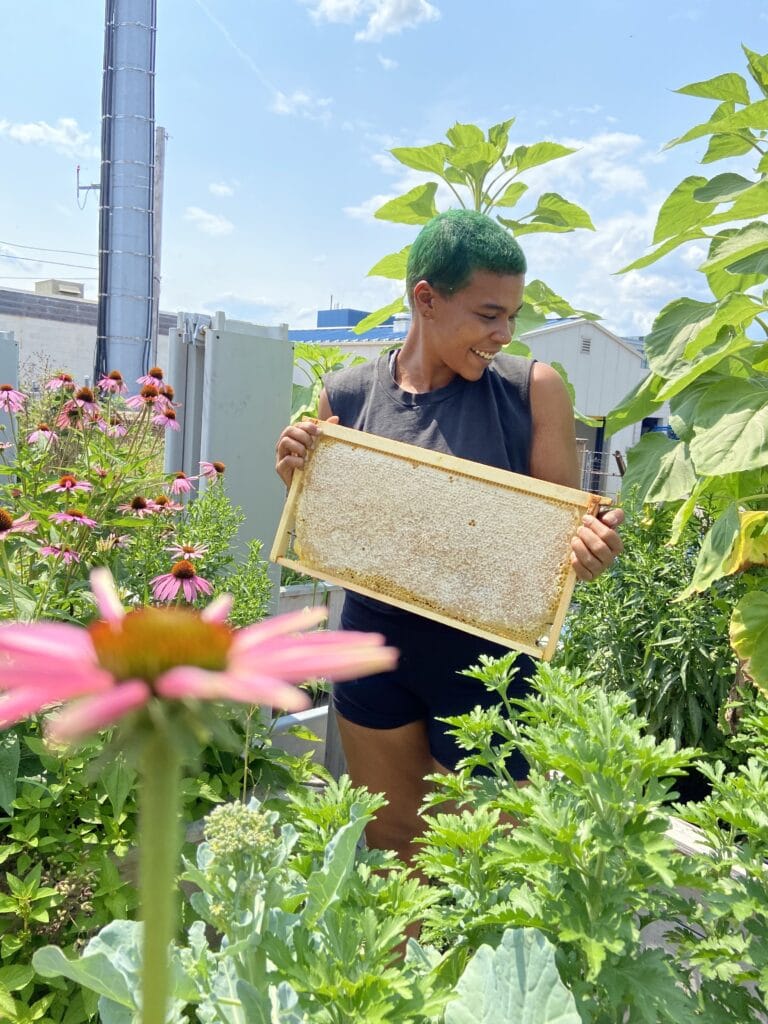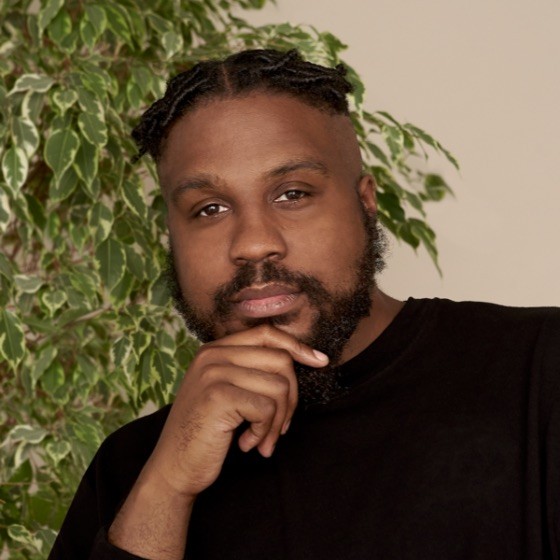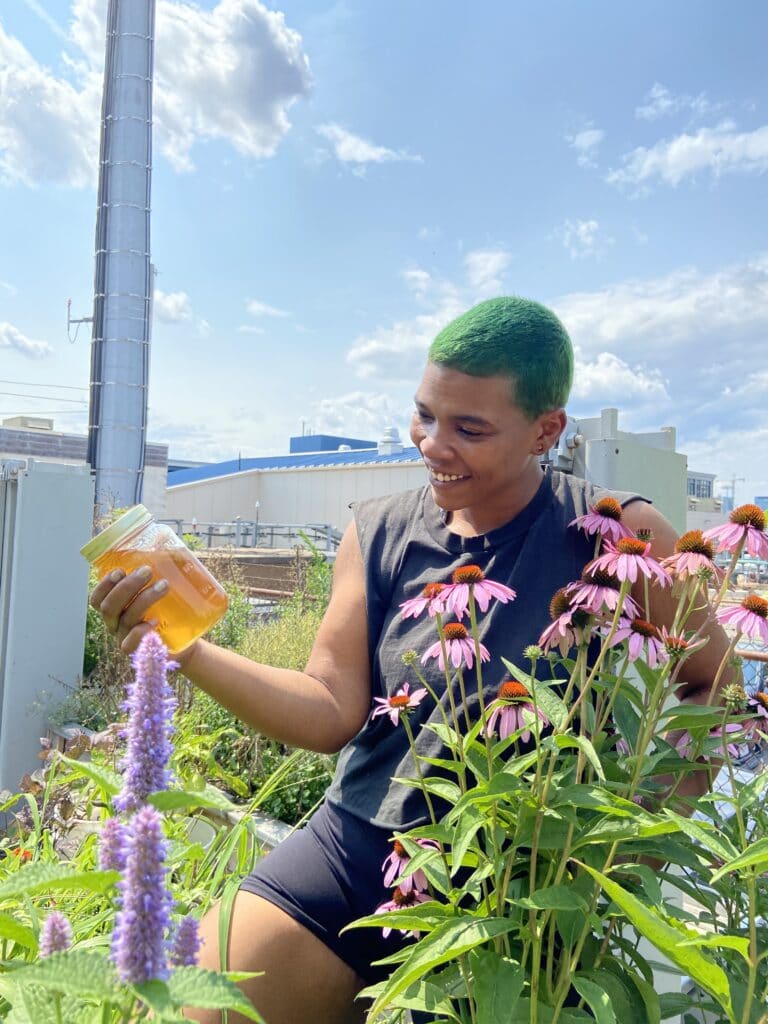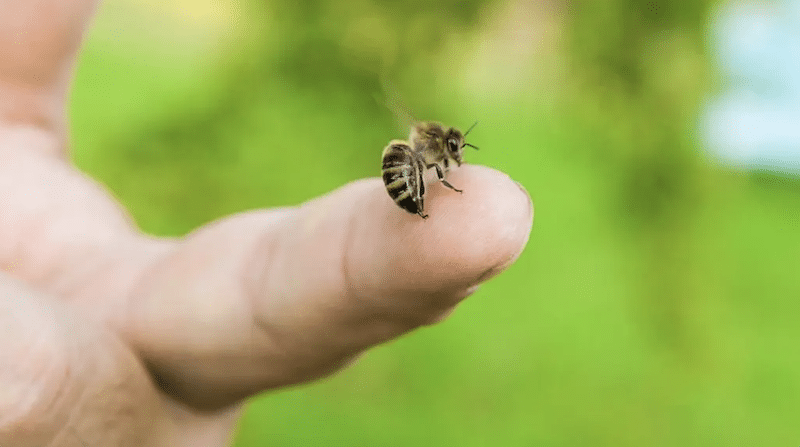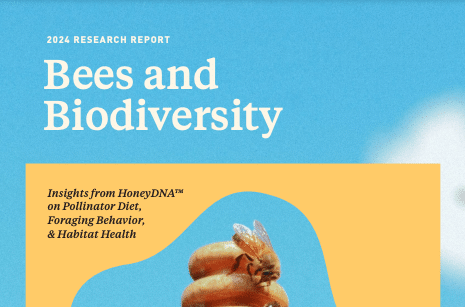If you’ve recently walked down the honey aisle at the grocery store, you might’ve asked yourself why does the color of honey vary. While some may prefer the lighter color honey due to its floral and delicate taste, others may prefer the darker color due to its stronger flavor.
Based on its optical density, the US Department of Agriculture has designated seven different colors for extracted honey including:
- Water White
- Extra White
- White
- Extra Light Amber
- Light Amber
- Amber
- Dark Amber
According to My Bee Line, “The color of honey is also related to the season in which it is harvested. For example, honey harvested in the spring, such as spring, acacia and clover honey, is light and transparent.” Honey harvested in the summer is typically amber, while honey yielded in the autumn is darker.
The Best Bees Company’s Lead Harvester and this month’s next-generation beekeeper, Che Ashley, highlights the importance of honey diversity, honey’s healing properties, and how honey reconnects us back to nature and the earth in their interview with Creative Director Paige Mulhern.
As lead harvester, Che is responsible for the handling of honey from extraction to bottling and labeling. Below, they capture how they’re constantly learning in this role, even though they are still afraid of bees.
Continue reading to learn more about how bees always seem to surprise us and why all beekeepers and hobbyists should request HoneyDNA samples from their harvested honey.
What’s your name?
Chelin Ashley
What are your preferred pronouns?
I prefer They/Them pronouns.
Where are you from?
I was born and raised here in Boston, Massachusetts.
What’s your title at Best Bees?
I am the lead harvester in the Harvesting department.
And what does a lead harvester do?
I am responsible for overseeing operations in harvesting which includes processing client honey, getting nice and sticky, unpacking frames, extracting them, bottling them, labeling them to ensure they’re on brand. And then coordinating with other beekeepers to make sure they get out to clients on time.
Is this the first time we’ve had a lead harvester?
Yes, it is. It is a newer position.
How do you feel about being the first in this role?
It’s a lot of pressure, definitely. In a weird way, I enjoy the responsibility. I like to go through the process of harvesting with a fine tooth comb. It’s nice to be able to oversee things and actually have a responsibility to catch everything that’s falling.
Let’s talk about honey! How many pounds of honey do you think you’ll harvest this year?
I can only go based off of last year. Last year we processed about 7 tons of honey. I don’t know what that is in pounds.
Isn’t a ton 2000 pounds?
I think so. It’s somewhere between 1.5 and 2.
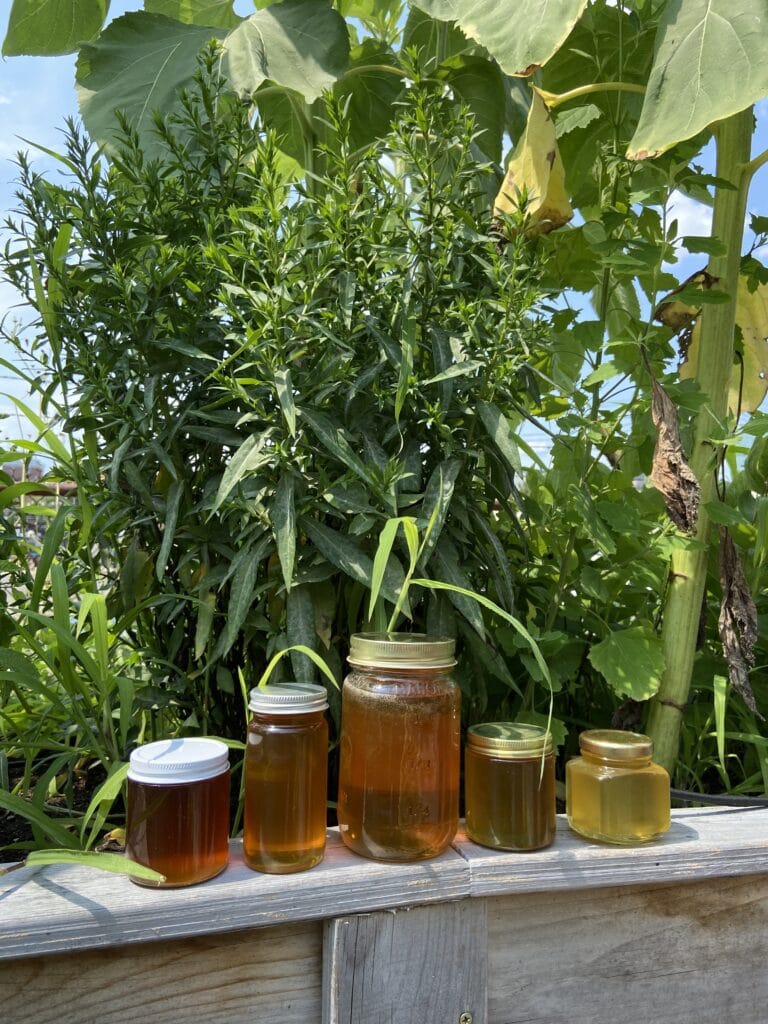
Tell me a little bit about honey. What did you know about honey before this job? Was it honey that drew you to Best Bees? What do you love about honey and what do you hate about honey?
Before coming to Best Bees, most of the knowledge I had about honey – aside from that it’s like oh it’s nice and teas and stuff- was mostly of the importance of the healing properties that it has. I do a lot of work about wildcrafting and foraging and I like to use honey as a baseline in all of my recipes to help boost it.
What I didn’t know about honey that I learned when I came here is the diversity and culinary aspect of it. It took an experience where someone goes “I don’t think honey goes well with black tea.” I kind of paused for a moment and I asked why. They responded, well the flavors are so rich that they clash together.
I had never once thought of the different flavors of honey because I was so used to store-bought honey or just the occasional time you’d find raw honey and it’s just like yeah, this is great because it’s just raw.
Almost like this is the one jar I get to have all year.
Yeah, yeah. Now I’ve learned so much about the elements of honey, what contributes to the taste, the varying differences like it’s more iron-rich in the fall, what flowers are being used more likely throughout the season to make honey, and the different flavors that come with it.
Che describes the differences between fall and spring honey.
I started to look at honey in different countries. One of our co workers brought in Greek honey which was really good. I’ve come across Japanese honey that was infused with yuzu. My culinary palette with honey has tripled since I’ve joined this job.
Have you nerded out yet about HoneyDNA?
Yes, definitely. (Laughs) I definitely have. I am trying to constantly pull myself back from nerding out too much. When I see a really crazy shade of honey, I’m like I wish this client would request some HoneyDNA.
So what do you love and what do you hate?
I love the varying shades and varying flavors of honey. It’s always interesting to me. I always tell people, “Thanks to this job, I’ve seen more shades of honey than the average person.”
50 Shades of Honey?
50 Shades of Honey. (Shared laughter).
With that being said, honey can be funky sometimes. With it being so rich, sometimes I come into the shop and I’m like that’s a heavy hit. There’s not much that I hate about honey.
We’ve talked about how I hate being sticky with honey afterwards. That is probably the most annoying thing for me. When I’m in the shop, I’m always prepared to be sticky, but when I’m outside, I drop honey on myself from making tea and I just get really frustrated.
But I feel like even that is a hard thing to say as a hate for honey. I’ll accept the stickiness.
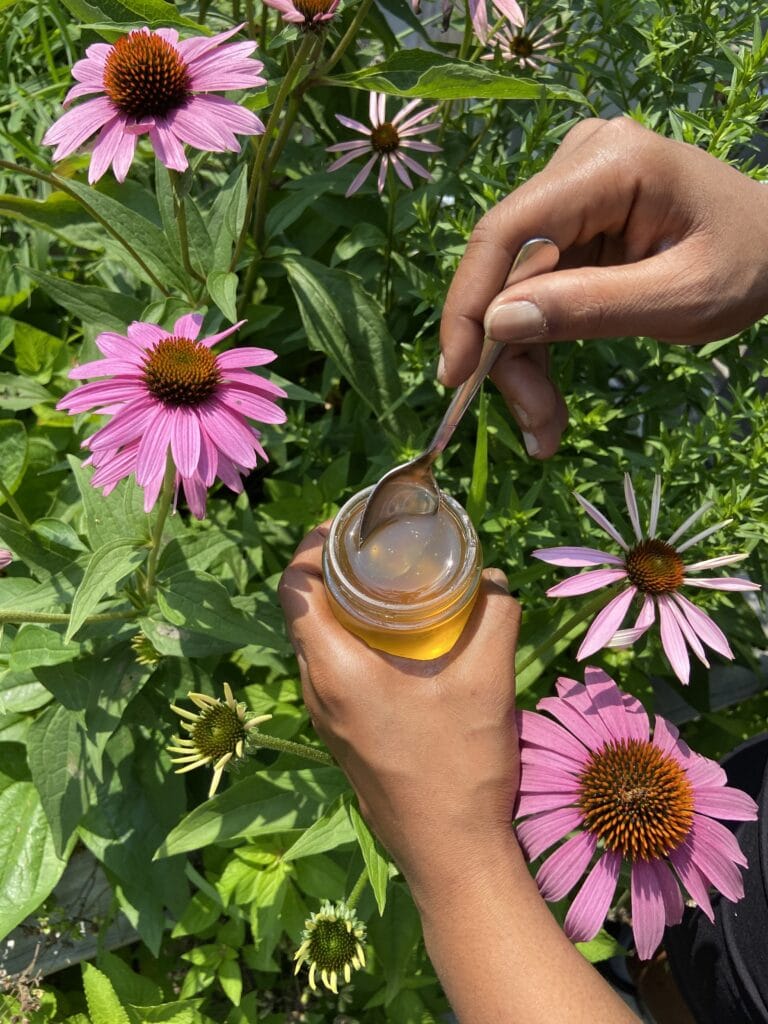
Yeah, I feel like honey is too precious and a cure of the Gods. It’s so lovely it’s hard to hate.
Yes, absolutely.
What drew you to Best Bees?
Location was a big, important part to me in part with the work that’s done. I had already known about BeeInformed.org and that was one of the first connections that I made when I first found out about Best Bees.
I was like yes, I love this idea of collecting mass information and having a more active role in affecting bee health and world health in general as opposed to just doing it from a hobbyist perspective.
I feel like with anybody that gets into nitty-gritty work, it’s hard to feel like you’re making a full change, but when we see more hives popping up and honeybees that come back to areas, you actually feel validated and like you’re making a difference in the world.
What is your favorite thing about your job?
I want to say the never-ending knowledge. Even though my position is in harvesting, I’m constantly learning about bees and learning from them as well. Learning that sometimes life is a little clumsy- sometimes you run into a wall and fall down, but get back up and be diligent and keep working.
I feel like I learn a lot at this job, not only about bees and honey. I learn about the culture of beekeeping and the culture of where people come from and where beekeeping has an importance in their cultures.
What’s your favorite thing about bees?
They always surprise me.
I feel like anytime I have a pretty good eye for bees, there will be a new species that comes by and I’ve never noticed it before. Even from each individual bee species and finding really gorgeous drones that have metallic tones instead of bright orange tones. Those little small variances that were always gifted from things being natural and not manufactured. Those are the things I admire most about the bees.
Would you rather be a queen bee, worker bee, or a drone?
Ooh. Definitely a worker bee.
I love the different stages of life. They’re freshly hatched, then they help to nurse the other freshly hatched ones. And then you slowly work your way up to guarding the lives and then the final step is go out into the world and explore your five mile radius.
It’s a short life, but it’s a good short life.
That’s usually the fact about bees that surprises people. The fact of how short their lives are. That three week span. When people ask me that, they’re always surprised.
I always try to explain to people how much work they do in those three weeks and why bees across all cultures are symbols for teamwork and hard work.
Are you afraid of bees?
Yeah. Yeah.
I will still say I am still scared of bees. I don’t know what other past answers have been, but when I came into this job I was like Oh, there’s a lot of bees.
I saw so many beekeepers that were like yeah, it’s whatever.
Okay, but you’re still going to get stung! I of course hadn’t been stung by a honeybee in years and the first one I got was super painful and I swelled up a bunch.
At the same time, I have so much respect for them, it’s a respectful fear. I’m not one of the beekeepers that goes into a hive before gearing up. I always make sure I put my gear on and feel as comfortable as possible, so the bees can feel as comfortable as possible.
There are always bees flying around the shop because they love harvesting and are attracted to the smell of honey. In that sense, I’m definitely much less scared than your average person. I’m used to being around them, but there’s a very humbling fear that comes with working with bees and I like to honor that.
Great answer and definitely no shame at all. Some people say not at all and my answer is pretty much the same.
Everytime I get a little ballsy, I get stung.
Yesterday we did a demo at Bridge Boston Charter School in front of a bunch of kids and I was telling Stephen there’s this old beekeeping trip I figured out from this guy that went into hives that had not been touched for five years. He went into them without any gear. Usually, if you run your bare hand over the top of the hive and they don’t stick their butts up, they’re temperament is usually a bit more calm.
I had done that and checked. They didn’t lift their butts up. We were doing this prenotation to kids.
Yeah, so you really wanted to check. Were you like an inch above them?
Yes, I just hovered over them so they could feel the warmth. And I was like they didn’t. As soon as I put my hand back in my glove, I got stung right in the thumb.
I had to pull my glove down and was like Ooh, just gotta hold it like this for a quick second.
It was hilarious. There was a group of kids walking by and they said, “Hey, don’t get stung.”
I said back, “I got you. I won’t.”
And as soon as I got into the hive, I got stung.
Anything I didn’t ask about that you want to chat about?
I just want to say why honey is important to me.
I think that the healing properties of honey and things that we can learn from bees in general is really sacred information. My goal is to take the experiences that I’ve had and the lessons that I’ve learned and bring those back to my community and find a way for the community to learn to heal itself.
Being a next-gen beekeeper, I’m the very first person in my family doing anything like this. It’s a big step in my goal to be able to reconnect black and brown folx with nature and the land that’s right beneath their feet.
I feel like honeybees and honey are one of the easiest ways to start that. It’s directly validating- you get honey. Sometimes you don’t, but you always get a little, little bit of sweetness.
That’s why I work so hard at my job. The work is important. It’s hard to explain to people why this work is important, but it’s the lasting impact that exists after this that I’m looking forward to and being able to make a difference.


